Ethics and Governance: Analyzing the Clearcast-Iceland Foods Case
VerifiedAdded on 2022/12/26
|10
|2562
|100
Essay
AI Summary
This essay examines the ethical and governance considerations surrounding Clearcast's decision to ban an Iceland Foods advertisement. The essay begins by introducing the case, where Clearcast, a non-governmental organization that clears ads for UK television, banned an Iceland Foods advertisement due to its political nature. The essay then presents arguments both for and against Clearcast's decision. The arguments for the ban focus on the potential for the advertisement to create political and social issues, and the ethical responsibilities of the organization. Arguments against the ban emphasize the importance of public discourse on social and political issues, even if they are related to environmental concerns. The essay concludes by supporting the ban of the advertisement and the need for ethical advertisements before broadcasting them on television.
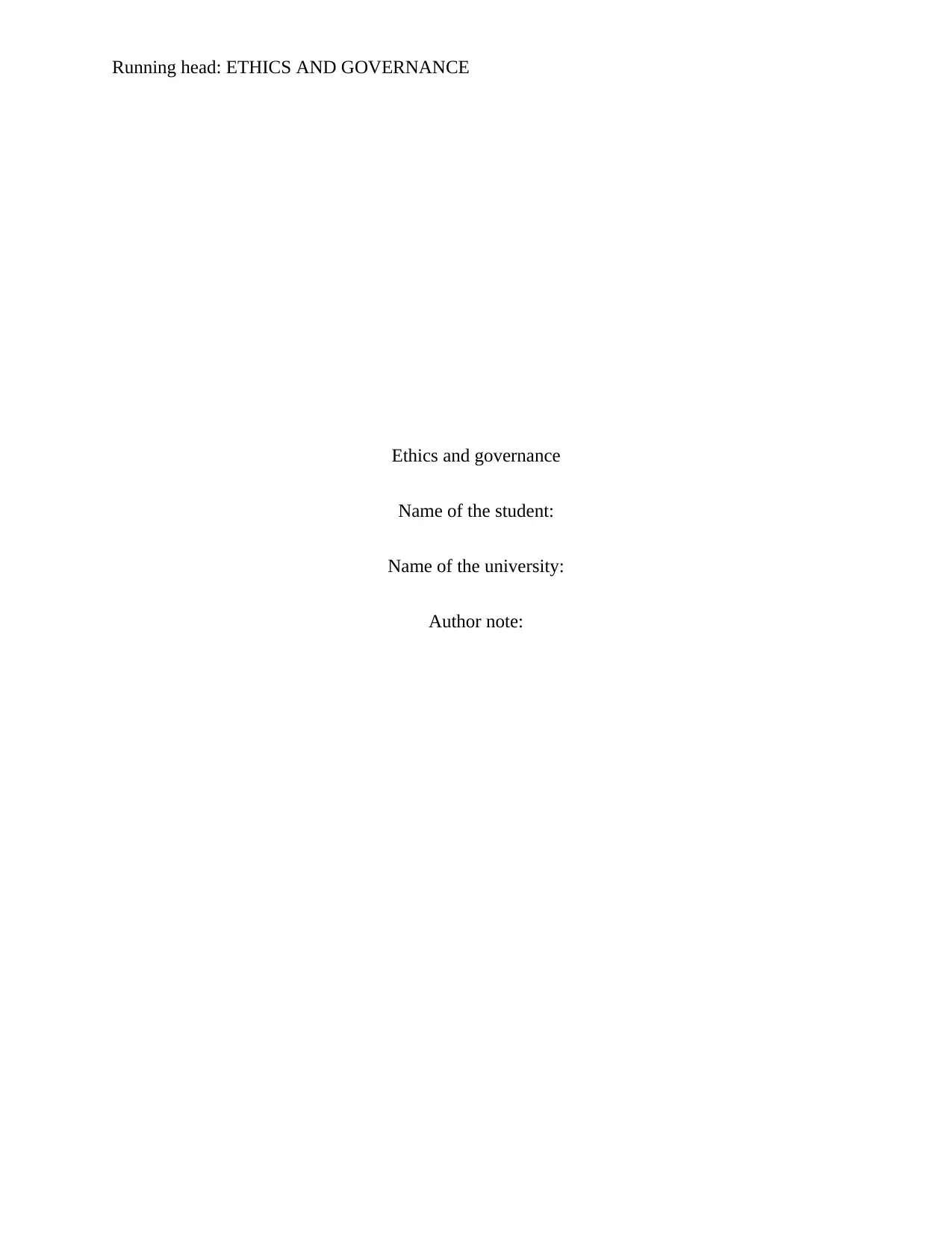
Running head: ETHICS AND GOVERNANCE
Ethics and governance
Name of the student:
Name of the university:
Author note:
Ethics and governance
Name of the student:
Name of the university:
Author note:
Paraphrase This Document
Need a fresh take? Get an instant paraphrase of this document with our AI Paraphraser
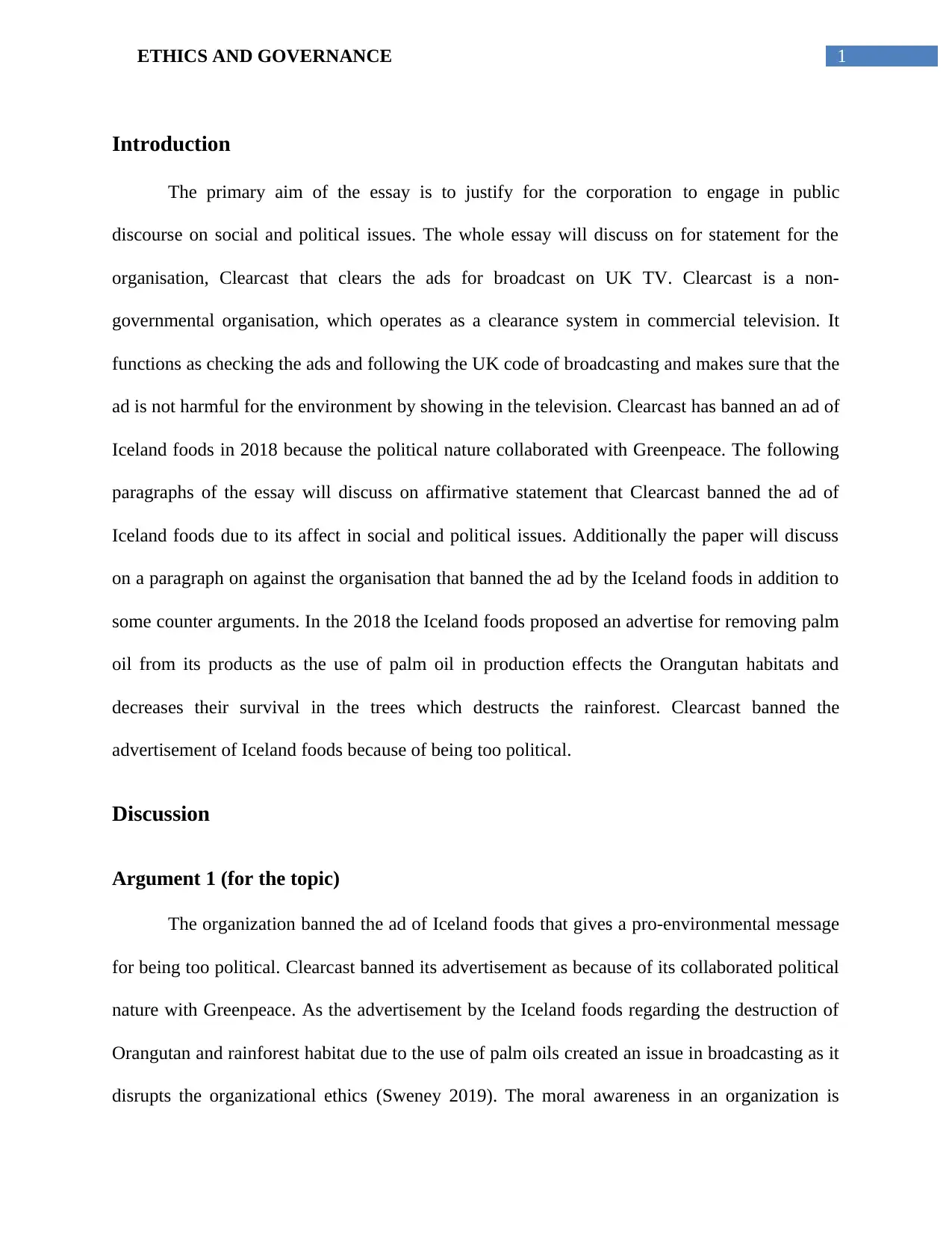
1ETHICS AND GOVERNANCE
Introduction
The primary aim of the essay is to justify for the corporation to engage in public
discourse on social and political issues. The whole essay will discuss on for statement for the
organisation, Clearcast that clears the ads for broadcast on UK TV. Clearcast is a non-
governmental organisation, which operates as a clearance system in commercial television. It
functions as checking the ads and following the UK code of broadcasting and makes sure that the
ad is not harmful for the environment by showing in the television. Clearcast has banned an ad of
Iceland foods in 2018 because the political nature collaborated with Greenpeace. The following
paragraphs of the essay will discuss on affirmative statement that Clearcast banned the ad of
Iceland foods due to its affect in social and political issues. Additionally the paper will discuss
on a paragraph on against the organisation that banned the ad by the Iceland foods in addition to
some counter arguments. In the 2018 the Iceland foods proposed an advertise for removing palm
oil from its products as the use of palm oil in production effects the Orangutan habitats and
decreases their survival in the trees which destructs the rainforest. Clearcast banned the
advertisement of Iceland foods because of being too political.
Discussion
Argument 1 (for the topic)
The organization banned the ad of Iceland foods that gives a pro-environmental message
for being too political. Clearcast banned its advertisement as because of its collaborated political
nature with Greenpeace. As the advertisement by the Iceland foods regarding the destruction of
Orangutan and rainforest habitat due to the use of palm oils created an issue in broadcasting as it
disrupts the organizational ethics (Sweney 2019). The moral awareness in an organization is
Introduction
The primary aim of the essay is to justify for the corporation to engage in public
discourse on social and political issues. The whole essay will discuss on for statement for the
organisation, Clearcast that clears the ads for broadcast on UK TV. Clearcast is a non-
governmental organisation, which operates as a clearance system in commercial television. It
functions as checking the ads and following the UK code of broadcasting and makes sure that the
ad is not harmful for the environment by showing in the television. Clearcast has banned an ad of
Iceland foods in 2018 because the political nature collaborated with Greenpeace. The following
paragraphs of the essay will discuss on affirmative statement that Clearcast banned the ad of
Iceland foods due to its affect in social and political issues. Additionally the paper will discuss
on a paragraph on against the organisation that banned the ad by the Iceland foods in addition to
some counter arguments. In the 2018 the Iceland foods proposed an advertise for removing palm
oil from its products as the use of palm oil in production effects the Orangutan habitats and
decreases their survival in the trees which destructs the rainforest. Clearcast banned the
advertisement of Iceland foods because of being too political.
Discussion
Argument 1 (for the topic)
The organization banned the ad of Iceland foods that gives a pro-environmental message
for being too political. Clearcast banned its advertisement as because of its collaborated political
nature with Greenpeace. As the advertisement by the Iceland foods regarding the destruction of
Orangutan and rainforest habitat due to the use of palm oils created an issue in broadcasting as it
disrupts the organizational ethics (Sweney 2019). The moral awareness in an organization is
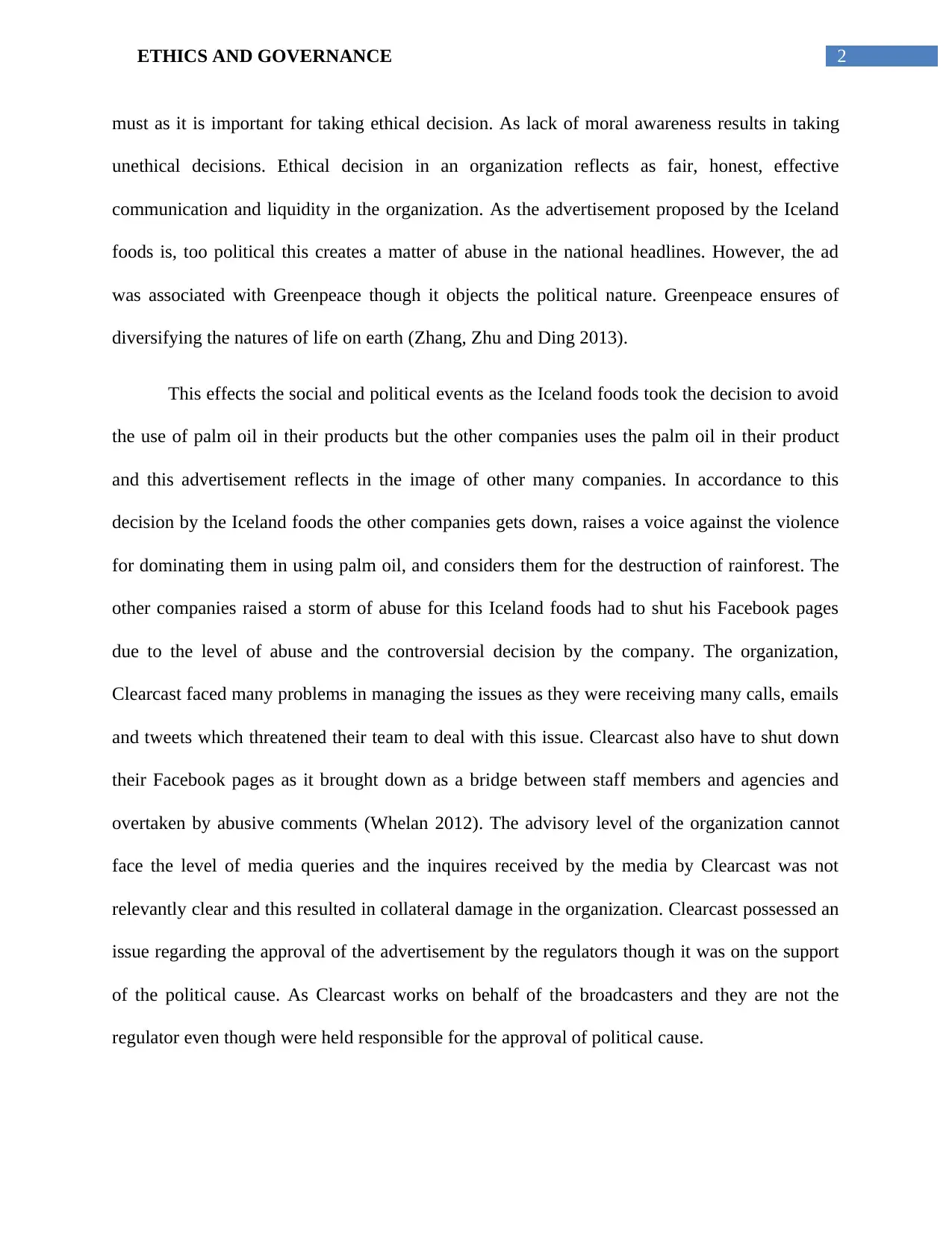
2ETHICS AND GOVERNANCE
must as it is important for taking ethical decision. As lack of moral awareness results in taking
unethical decisions. Ethical decision in an organization reflects as fair, honest, effective
communication and liquidity in the organization. As the advertisement proposed by the Iceland
foods is, too political this creates a matter of abuse in the national headlines. However, the ad
was associated with Greenpeace though it objects the political nature. Greenpeace ensures of
diversifying the natures of life on earth (Zhang, Zhu and Ding 2013).
This effects the social and political events as the Iceland foods took the decision to avoid
the use of palm oil in their products but the other companies uses the palm oil in their product
and this advertisement reflects in the image of other many companies. In accordance to this
decision by the Iceland foods the other companies gets down, raises a voice against the violence
for dominating them in using palm oil, and considers them for the destruction of rainforest. The
other companies raised a storm of abuse for this Iceland foods had to shut his Facebook pages
due to the level of abuse and the controversial decision by the company. The organization,
Clearcast faced many problems in managing the issues as they were receiving many calls, emails
and tweets which threatened their team to deal with this issue. Clearcast also have to shut down
their Facebook pages as it brought down as a bridge between staff members and agencies and
overtaken by abusive comments (Whelan 2012). The advisory level of the organization cannot
face the level of media queries and the inquires received by the media by Clearcast was not
relevantly clear and this resulted in collateral damage in the organization. Clearcast possessed an
issue regarding the approval of the advertisement by the regulators though it was on the support
of the political cause. As Clearcast works on behalf of the broadcasters and they are not the
regulator even though were held responsible for the approval of political cause.
must as it is important for taking ethical decision. As lack of moral awareness results in taking
unethical decisions. Ethical decision in an organization reflects as fair, honest, effective
communication and liquidity in the organization. As the advertisement proposed by the Iceland
foods is, too political this creates a matter of abuse in the national headlines. However, the ad
was associated with Greenpeace though it objects the political nature. Greenpeace ensures of
diversifying the natures of life on earth (Zhang, Zhu and Ding 2013).
This effects the social and political events as the Iceland foods took the decision to avoid
the use of palm oil in their products but the other companies uses the palm oil in their product
and this advertisement reflects in the image of other many companies. In accordance to this
decision by the Iceland foods the other companies gets down, raises a voice against the violence
for dominating them in using palm oil, and considers them for the destruction of rainforest. The
other companies raised a storm of abuse for this Iceland foods had to shut his Facebook pages
due to the level of abuse and the controversial decision by the company. The organization,
Clearcast faced many problems in managing the issues as they were receiving many calls, emails
and tweets which threatened their team to deal with this issue. Clearcast also have to shut down
their Facebook pages as it brought down as a bridge between staff members and agencies and
overtaken by abusive comments (Whelan 2012). The advisory level of the organization cannot
face the level of media queries and the inquires received by the media by Clearcast was not
relevantly clear and this resulted in collateral damage in the organization. Clearcast possessed an
issue regarding the approval of the advertisement by the regulators though it was on the support
of the political cause. As Clearcast works on behalf of the broadcasters and they are not the
regulator even though were held responsible for the approval of political cause.
⊘ This is a preview!⊘
Do you want full access?
Subscribe today to unlock all pages.

Trusted by 1+ million students worldwide
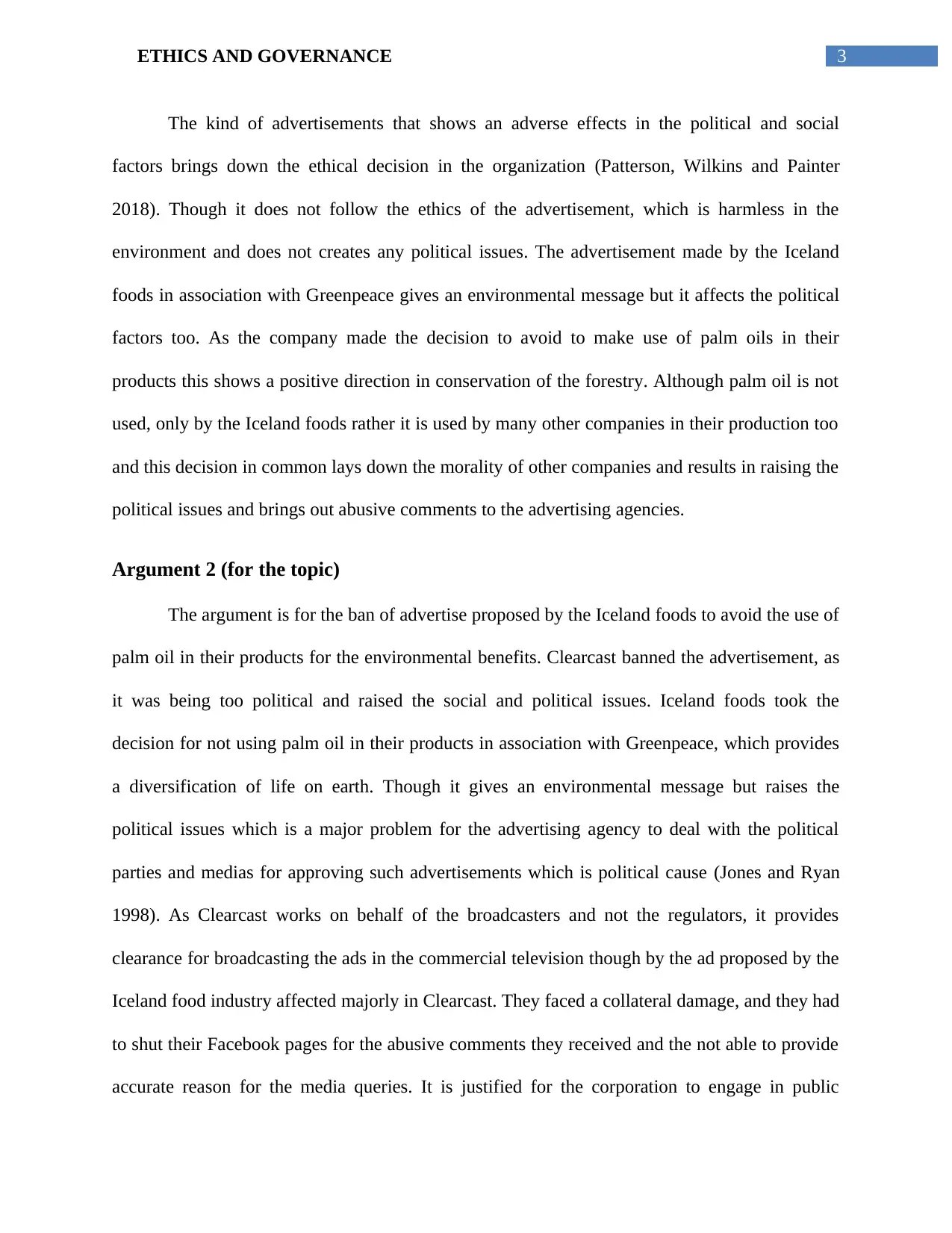
3ETHICS AND GOVERNANCE
The kind of advertisements that shows an adverse effects in the political and social
factors brings down the ethical decision in the organization (Patterson, Wilkins and Painter
2018). Though it does not follow the ethics of the advertisement, which is harmless in the
environment and does not creates any political issues. The advertisement made by the Iceland
foods in association with Greenpeace gives an environmental message but it affects the political
factors too. As the company made the decision to avoid to make use of palm oils in their
products this shows a positive direction in conservation of the forestry. Although palm oil is not
used, only by the Iceland foods rather it is used by many other companies in their production too
and this decision in common lays down the morality of other companies and results in raising the
political issues and brings out abusive comments to the advertising agencies.
Argument 2 (for the topic)
The argument is for the ban of advertise proposed by the Iceland foods to avoid the use of
palm oil in their products for the environmental benefits. Clearcast banned the advertisement, as
it was being too political and raised the social and political issues. Iceland foods took the
decision for not using palm oil in their products in association with Greenpeace, which provides
a diversification of life on earth. Though it gives an environmental message but raises the
political issues which is a major problem for the advertising agency to deal with the political
parties and medias for approving such advertisements which is political cause (Jones and Ryan
1998). As Clearcast works on behalf of the broadcasters and not the regulators, it provides
clearance for broadcasting the ads in the commercial television though by the ad proposed by the
Iceland food industry affected majorly in Clearcast. They faced a collateral damage, and they had
to shut their Facebook pages for the abusive comments they received and the not able to provide
accurate reason for the media queries. It is justified for the corporation to engage in public
The kind of advertisements that shows an adverse effects in the political and social
factors brings down the ethical decision in the organization (Patterson, Wilkins and Painter
2018). Though it does not follow the ethics of the advertisement, which is harmless in the
environment and does not creates any political issues. The advertisement made by the Iceland
foods in association with Greenpeace gives an environmental message but it affects the political
factors too. As the company made the decision to avoid to make use of palm oils in their
products this shows a positive direction in conservation of the forestry. Although palm oil is not
used, only by the Iceland foods rather it is used by many other companies in their production too
and this decision in common lays down the morality of other companies and results in raising the
political issues and brings out abusive comments to the advertising agencies.
Argument 2 (for the topic)
The argument is for the ban of advertise proposed by the Iceland foods to avoid the use of
palm oil in their products for the environmental benefits. Clearcast banned the advertisement, as
it was being too political and raised the social and political issues. Iceland foods took the
decision for not using palm oil in their products in association with Greenpeace, which provides
a diversification of life on earth. Though it gives an environmental message but raises the
political issues which is a major problem for the advertising agency to deal with the political
parties and medias for approving such advertisements which is political cause (Jones and Ryan
1998). As Clearcast works on behalf of the broadcasters and not the regulators, it provides
clearance for broadcasting the ads in the commercial television though by the ad proposed by the
Iceland food industry affected majorly in Clearcast. They faced a collateral damage, and they had
to shut their Facebook pages for the abusive comments they received and the not able to provide
accurate reason for the media queries. It is justified for the corporation to engage in public
Paraphrase This Document
Need a fresh take? Get an instant paraphrase of this document with our AI Paraphraser
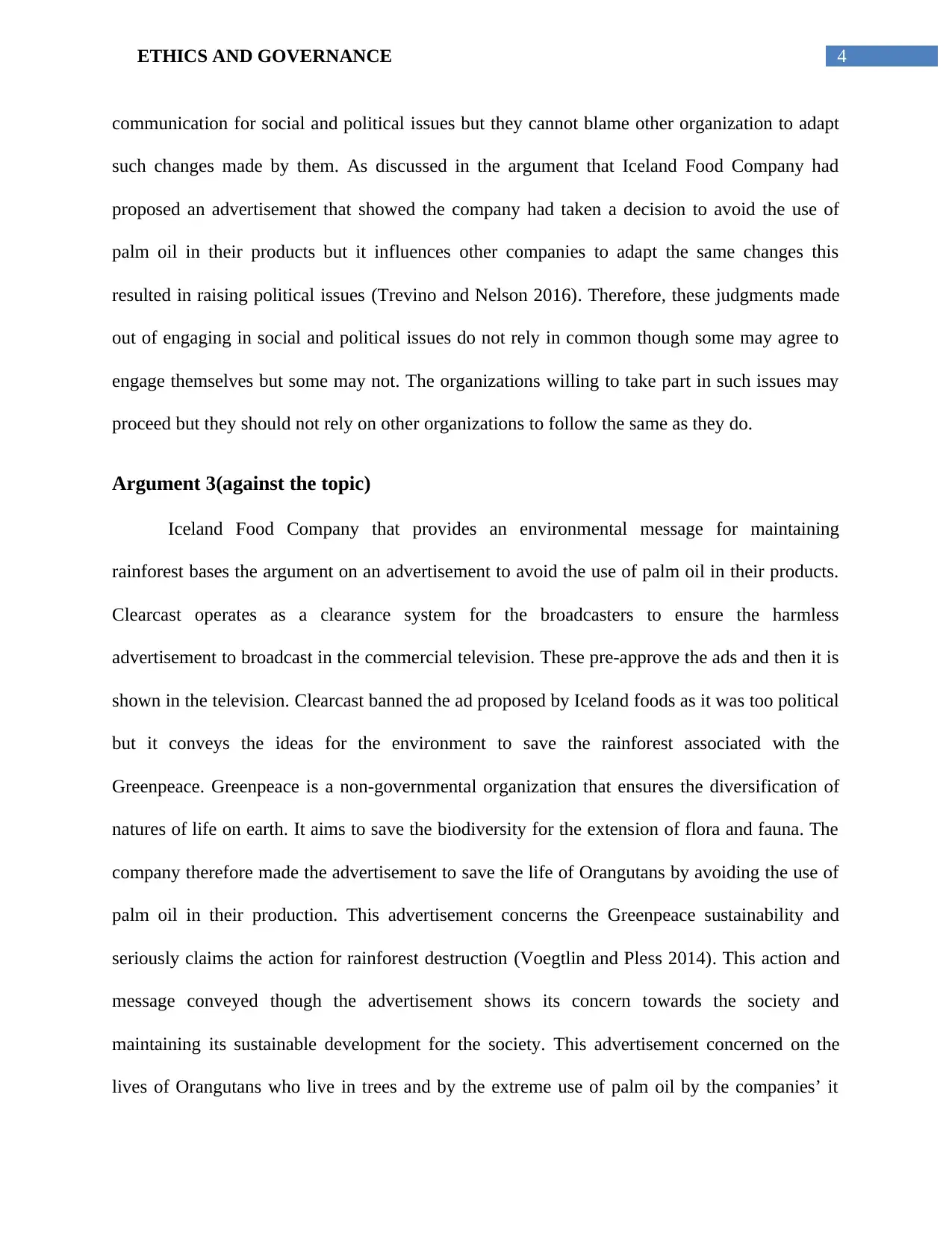
4ETHICS AND GOVERNANCE
communication for social and political issues but they cannot blame other organization to adapt
such changes made by them. As discussed in the argument that Iceland Food Company had
proposed an advertisement that showed the company had taken a decision to avoid the use of
palm oil in their products but it influences other companies to adapt the same changes this
resulted in raising political issues (Trevino and Nelson 2016). Therefore, these judgments made
out of engaging in social and political issues do not rely in common though some may agree to
engage themselves but some may not. The organizations willing to take part in such issues may
proceed but they should not rely on other organizations to follow the same as they do.
Argument 3(against the topic)
Iceland Food Company that provides an environmental message for maintaining
rainforest bases the argument on an advertisement to avoid the use of palm oil in their products.
Clearcast operates as a clearance system for the broadcasters to ensure the harmless
advertisement to broadcast in the commercial television. These pre-approve the ads and then it is
shown in the television. Clearcast banned the ad proposed by Iceland foods as it was too political
but it conveys the ideas for the environment to save the rainforest associated with the
Greenpeace. Greenpeace is a non-governmental organization that ensures the diversification of
natures of life on earth. It aims to save the biodiversity for the extension of flora and fauna. The
company therefore made the advertisement to save the life of Orangutans by avoiding the use of
palm oil in their production. This advertisement concerns the Greenpeace sustainability and
seriously claims the action for rainforest destruction (Voegtlin and Pless 2014). This action and
message conveyed though the advertisement shows its concern towards the society and
maintaining its sustainable development for the society. This advertisement concerned on the
lives of Orangutans who live in trees and by the extreme use of palm oil by the companies’ it
communication for social and political issues but they cannot blame other organization to adapt
such changes made by them. As discussed in the argument that Iceland Food Company had
proposed an advertisement that showed the company had taken a decision to avoid the use of
palm oil in their products but it influences other companies to adapt the same changes this
resulted in raising political issues (Trevino and Nelson 2016). Therefore, these judgments made
out of engaging in social and political issues do not rely in common though some may agree to
engage themselves but some may not. The organizations willing to take part in such issues may
proceed but they should not rely on other organizations to follow the same as they do.
Argument 3(against the topic)
Iceland Food Company that provides an environmental message for maintaining
rainforest bases the argument on an advertisement to avoid the use of palm oil in their products.
Clearcast operates as a clearance system for the broadcasters to ensure the harmless
advertisement to broadcast in the commercial television. These pre-approve the ads and then it is
shown in the television. Clearcast banned the ad proposed by Iceland foods as it was too political
but it conveys the ideas for the environment to save the rainforest associated with the
Greenpeace. Greenpeace is a non-governmental organization that ensures the diversification of
natures of life on earth. It aims to save the biodiversity for the extension of flora and fauna. The
company therefore made the advertisement to save the life of Orangutans by avoiding the use of
palm oil in their production. This advertisement concerns the Greenpeace sustainability and
seriously claims the action for rainforest destruction (Voegtlin and Pless 2014). This action and
message conveyed though the advertisement shows its concern towards the society and
maintaining its sustainable development for the society. This advertisement concerned on the
lives of Orangutans who live in trees and by the extreme use of palm oil by the companies’ it
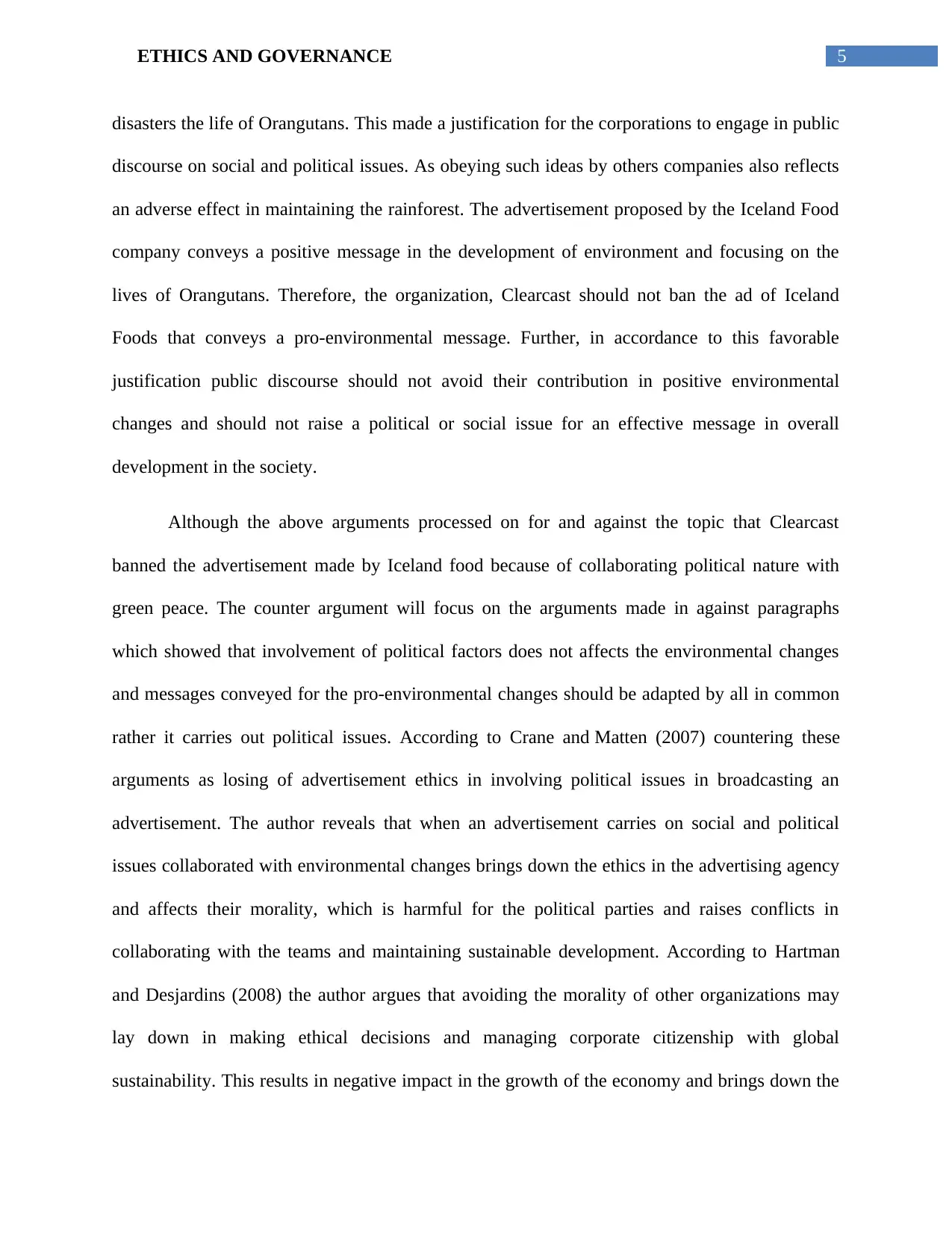
5ETHICS AND GOVERNANCE
disasters the life of Orangutans. This made a justification for the corporations to engage in public
discourse on social and political issues. As obeying such ideas by others companies also reflects
an adverse effect in maintaining the rainforest. The advertisement proposed by the Iceland Food
company conveys a positive message in the development of environment and focusing on the
lives of Orangutans. Therefore, the organization, Clearcast should not ban the ad of Iceland
Foods that conveys a pro-environmental message. Further, in accordance to this favorable
justification public discourse should not avoid their contribution in positive environmental
changes and should not raise a political or social issue for an effective message in overall
development in the society.
Although the above arguments processed on for and against the topic that Clearcast
banned the advertisement made by Iceland food because of collaborating political nature with
green peace. The counter argument will focus on the arguments made in against paragraphs
which showed that involvement of political factors does not affects the environmental changes
and messages conveyed for the pro-environmental changes should be adapted by all in common
rather it carries out political issues. According to Crane and Matten (2007) countering these
arguments as losing of advertisement ethics in involving political issues in broadcasting an
advertisement. The author reveals that when an advertisement carries on social and political
issues collaborated with environmental changes brings down the ethics in the advertising agency
and affects their morality, which is harmful for the political parties and raises conflicts in
collaborating with the teams and maintaining sustainable development. According to Hartman
and Desjardins (2008) the author argues that avoiding the morality of other organizations may
lay down in making ethical decisions and managing corporate citizenship with global
sustainability. This results in negative impact in the growth of the economy and brings down the
disasters the life of Orangutans. This made a justification for the corporations to engage in public
discourse on social and political issues. As obeying such ideas by others companies also reflects
an adverse effect in maintaining the rainforest. The advertisement proposed by the Iceland Food
company conveys a positive message in the development of environment and focusing on the
lives of Orangutans. Therefore, the organization, Clearcast should not ban the ad of Iceland
Foods that conveys a pro-environmental message. Further, in accordance to this favorable
justification public discourse should not avoid their contribution in positive environmental
changes and should not raise a political or social issue for an effective message in overall
development in the society.
Although the above arguments processed on for and against the topic that Clearcast
banned the advertisement made by Iceland food because of collaborating political nature with
green peace. The counter argument will focus on the arguments made in against paragraphs
which showed that involvement of political factors does not affects the environmental changes
and messages conveyed for the pro-environmental changes should be adapted by all in common
rather it carries out political issues. According to Crane and Matten (2007) countering these
arguments as losing of advertisement ethics in involving political issues in broadcasting an
advertisement. The author reveals that when an advertisement carries on social and political
issues collaborated with environmental changes brings down the ethics in the advertising agency
and affects their morality, which is harmful for the political parties and raises conflicts in
collaborating with the teams and maintaining sustainable development. According to Hartman
and Desjardins (2008) the author argues that avoiding the morality of other organizations may
lay down in making ethical decisions and managing corporate citizenship with global
sustainability. This results in negative impact in the growth of the economy and brings down the
⊘ This is a preview!⊘
Do you want full access?
Subscribe today to unlock all pages.

Trusted by 1+ million students worldwide
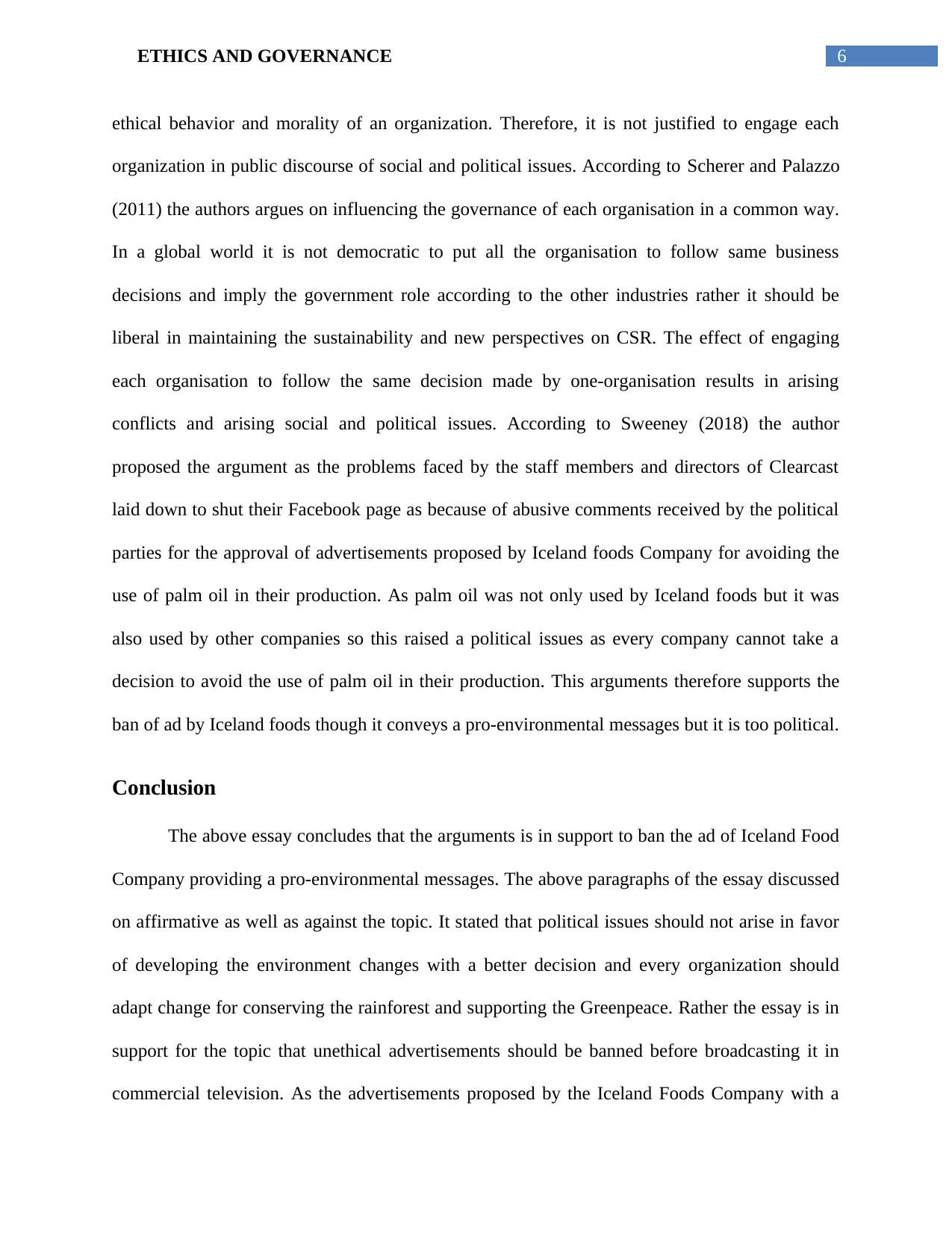
6ETHICS AND GOVERNANCE
ethical behavior and morality of an organization. Therefore, it is not justified to engage each
organization in public discourse of social and political issues. According to Scherer and Palazzo
(2011) the authors argues on influencing the governance of each organisation in a common way.
In a global world it is not democratic to put all the organisation to follow same business
decisions and imply the government role according to the other industries rather it should be
liberal in maintaining the sustainability and new perspectives on CSR. The effect of engaging
each organisation to follow the same decision made by one-organisation results in arising
conflicts and arising social and political issues. According to Sweeney (2018) the author
proposed the argument as the problems faced by the staff members and directors of Clearcast
laid down to shut their Facebook page as because of abusive comments received by the political
parties for the approval of advertisements proposed by Iceland foods Company for avoiding the
use of palm oil in their production. As palm oil was not only used by Iceland foods but it was
also used by other companies so this raised a political issues as every company cannot take a
decision to avoid the use of palm oil in their production. This arguments therefore supports the
ban of ad by Iceland foods though it conveys a pro-environmental messages but it is too political.
Conclusion
The above essay concludes that the arguments is in support to ban the ad of Iceland Food
Company providing a pro-environmental messages. The above paragraphs of the essay discussed
on affirmative as well as against the topic. It stated that political issues should not arise in favor
of developing the environment changes with a better decision and every organization should
adapt change for conserving the rainforest and supporting the Greenpeace. Rather the essay is in
support for the topic that unethical advertisements should be banned before broadcasting it in
commercial television. As the advertisements proposed by the Iceland Foods Company with a
ethical behavior and morality of an organization. Therefore, it is not justified to engage each
organization in public discourse of social and political issues. According to Scherer and Palazzo
(2011) the authors argues on influencing the governance of each organisation in a common way.
In a global world it is not democratic to put all the organisation to follow same business
decisions and imply the government role according to the other industries rather it should be
liberal in maintaining the sustainability and new perspectives on CSR. The effect of engaging
each organisation to follow the same decision made by one-organisation results in arising
conflicts and arising social and political issues. According to Sweeney (2018) the author
proposed the argument as the problems faced by the staff members and directors of Clearcast
laid down to shut their Facebook page as because of abusive comments received by the political
parties for the approval of advertisements proposed by Iceland foods Company for avoiding the
use of palm oil in their production. As palm oil was not only used by Iceland foods but it was
also used by other companies so this raised a political issues as every company cannot take a
decision to avoid the use of palm oil in their production. This arguments therefore supports the
ban of ad by Iceland foods though it conveys a pro-environmental messages but it is too political.
Conclusion
The above essay concludes that the arguments is in support to ban the ad of Iceland Food
Company providing a pro-environmental messages. The above paragraphs of the essay discussed
on affirmative as well as against the topic. It stated that political issues should not arise in favor
of developing the environment changes with a better decision and every organization should
adapt change for conserving the rainforest and supporting the Greenpeace. Rather the essay is in
support for the topic that unethical advertisements should be banned before broadcasting it in
commercial television. As the advertisements proposed by the Iceland Foods Company with a
Paraphrase This Document
Need a fresh take? Get an instant paraphrase of this document with our AI Paraphraser
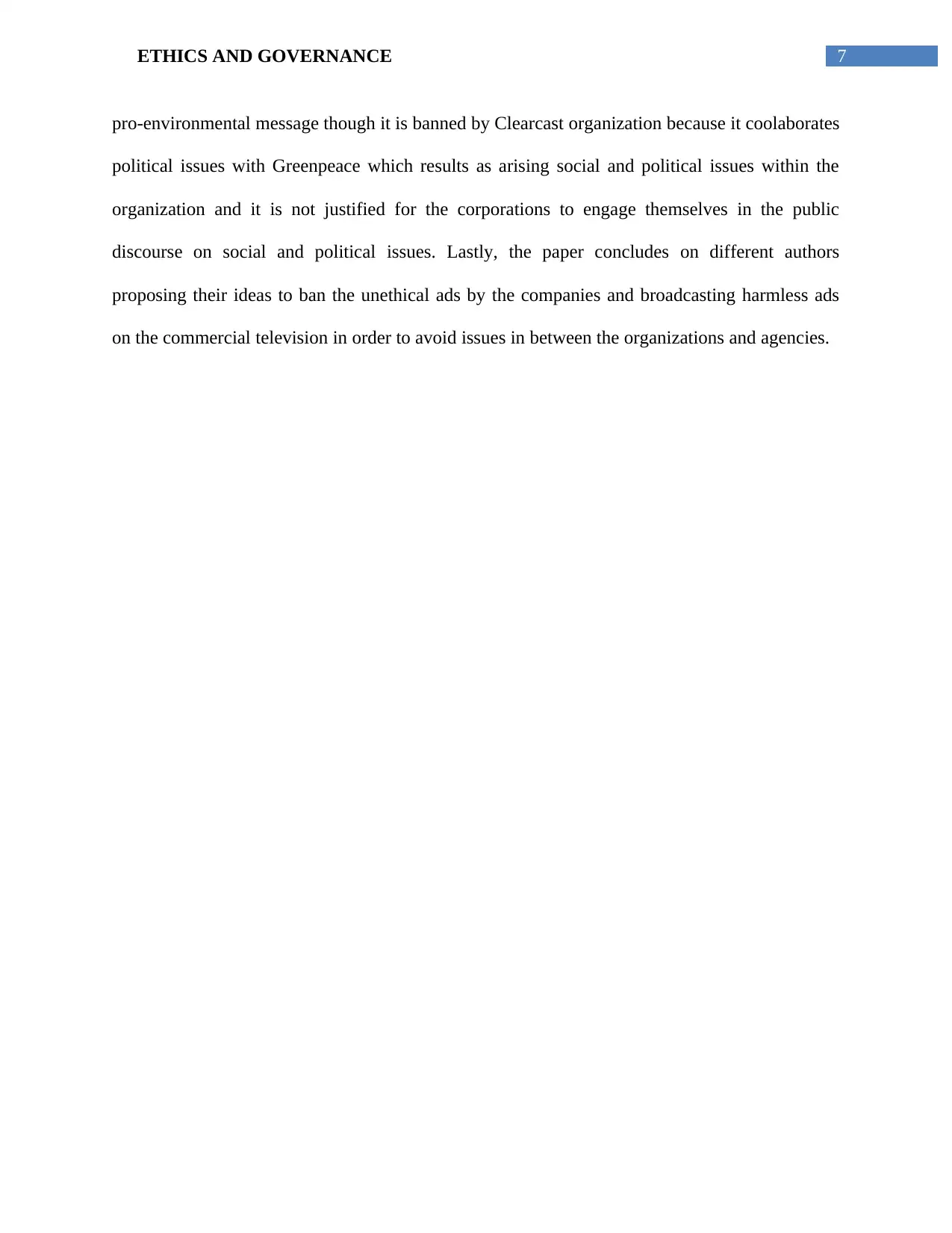
7ETHICS AND GOVERNANCE
pro-environmental message though it is banned by Clearcast organization because it coolaborates
political issues with Greenpeace which results as arising social and political issues within the
organization and it is not justified for the corporations to engage themselves in the public
discourse on social and political issues. Lastly, the paper concludes on different authors
proposing their ideas to ban the unethical ads by the companies and broadcasting harmless ads
on the commercial television in order to avoid issues in between the organizations and agencies.
pro-environmental message though it is banned by Clearcast organization because it coolaborates
political issues with Greenpeace which results as arising social and political issues within the
organization and it is not justified for the corporations to engage themselves in the public
discourse on social and political issues. Lastly, the paper concludes on different authors
proposing their ideas to ban the unethical ads by the companies and broadcasting harmless ads
on the commercial television in order to avoid issues in between the organizations and agencies.
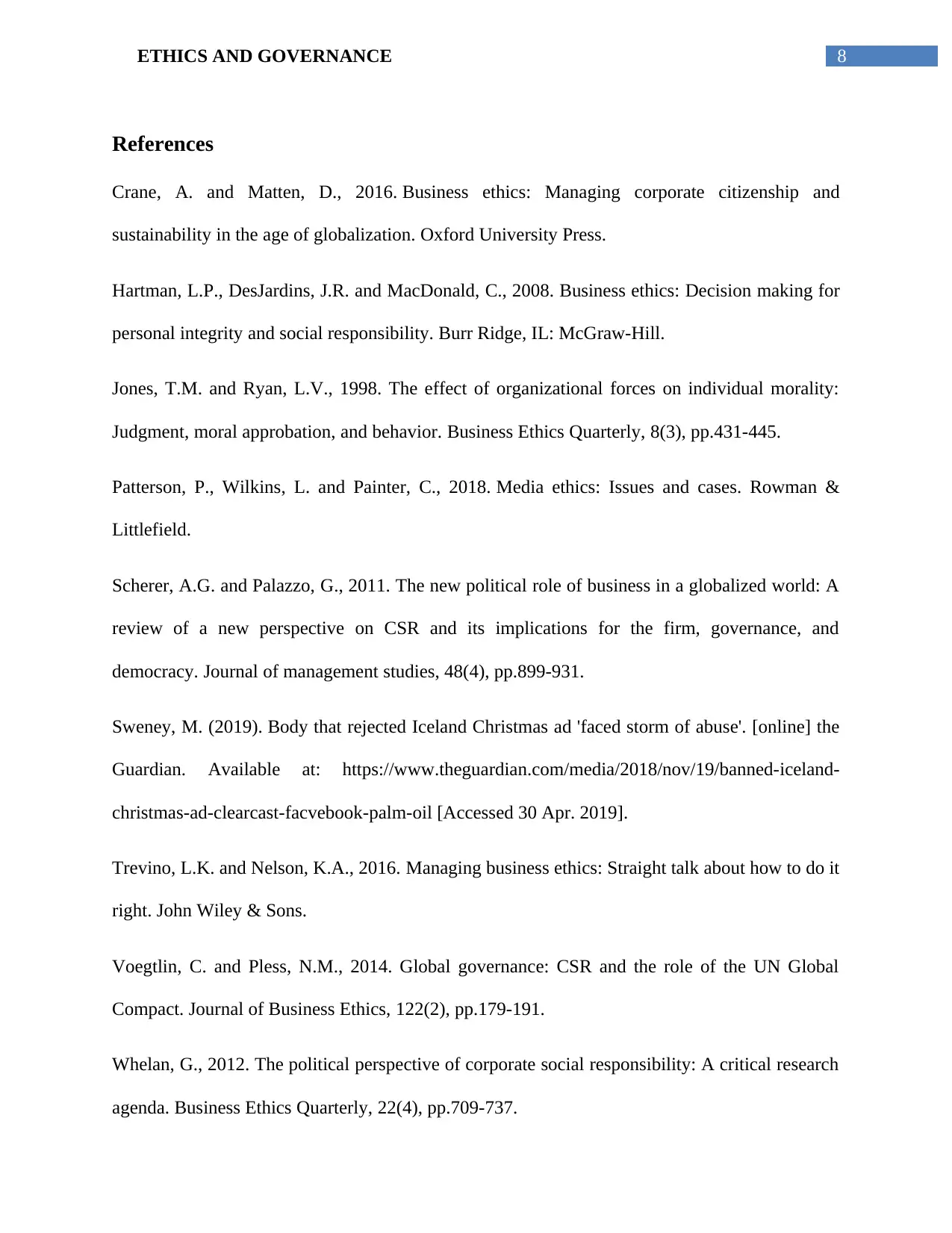
8ETHICS AND GOVERNANCE
References
Crane, A. and Matten, D., 2016. Business ethics: Managing corporate citizenship and
sustainability in the age of globalization. Oxford University Press.
Hartman, L.P., DesJardins, J.R. and MacDonald, C., 2008. Business ethics: Decision making for
personal integrity and social responsibility. Burr Ridge, IL: McGraw-Hill.
Jones, T.M. and Ryan, L.V., 1998. The effect of organizational forces on individual morality:
Judgment, moral approbation, and behavior. Business Ethics Quarterly, 8(3), pp.431-445.
Patterson, P., Wilkins, L. and Painter, C., 2018. Media ethics: Issues and cases. Rowman &
Littlefield.
Scherer, A.G. and Palazzo, G., 2011. The new political role of business in a globalized world: A
review of a new perspective on CSR and its implications for the firm, governance, and
democracy. Journal of management studies, 48(4), pp.899-931.
Sweney, M. (2019). Body that rejected Iceland Christmas ad 'faced storm of abuse'. [online] the
Guardian. Available at: https://www.theguardian.com/media/2018/nov/19/banned-iceland-
christmas-ad-clearcast-facvebook-palm-oil [Accessed 30 Apr. 2019].
Trevino, L.K. and Nelson, K.A., 2016. Managing business ethics: Straight talk about how to do it
right. John Wiley & Sons.
Voegtlin, C. and Pless, N.M., 2014. Global governance: CSR and the role of the UN Global
Compact. Journal of Business Ethics, 122(2), pp.179-191.
Whelan, G., 2012. The political perspective of corporate social responsibility: A critical research
agenda. Business Ethics Quarterly, 22(4), pp.709-737.
References
Crane, A. and Matten, D., 2016. Business ethics: Managing corporate citizenship and
sustainability in the age of globalization. Oxford University Press.
Hartman, L.P., DesJardins, J.R. and MacDonald, C., 2008. Business ethics: Decision making for
personal integrity and social responsibility. Burr Ridge, IL: McGraw-Hill.
Jones, T.M. and Ryan, L.V., 1998. The effect of organizational forces on individual morality:
Judgment, moral approbation, and behavior. Business Ethics Quarterly, 8(3), pp.431-445.
Patterson, P., Wilkins, L. and Painter, C., 2018. Media ethics: Issues and cases. Rowman &
Littlefield.
Scherer, A.G. and Palazzo, G., 2011. The new political role of business in a globalized world: A
review of a new perspective on CSR and its implications for the firm, governance, and
democracy. Journal of management studies, 48(4), pp.899-931.
Sweney, M. (2019). Body that rejected Iceland Christmas ad 'faced storm of abuse'. [online] the
Guardian. Available at: https://www.theguardian.com/media/2018/nov/19/banned-iceland-
christmas-ad-clearcast-facvebook-palm-oil [Accessed 30 Apr. 2019].
Trevino, L.K. and Nelson, K.A., 2016. Managing business ethics: Straight talk about how to do it
right. John Wiley & Sons.
Voegtlin, C. and Pless, N.M., 2014. Global governance: CSR and the role of the UN Global
Compact. Journal of Business Ethics, 122(2), pp.179-191.
Whelan, G., 2012. The political perspective of corporate social responsibility: A critical research
agenda. Business Ethics Quarterly, 22(4), pp.709-737.
⊘ This is a preview!⊘
Do you want full access?
Subscribe today to unlock all pages.

Trusted by 1+ million students worldwide
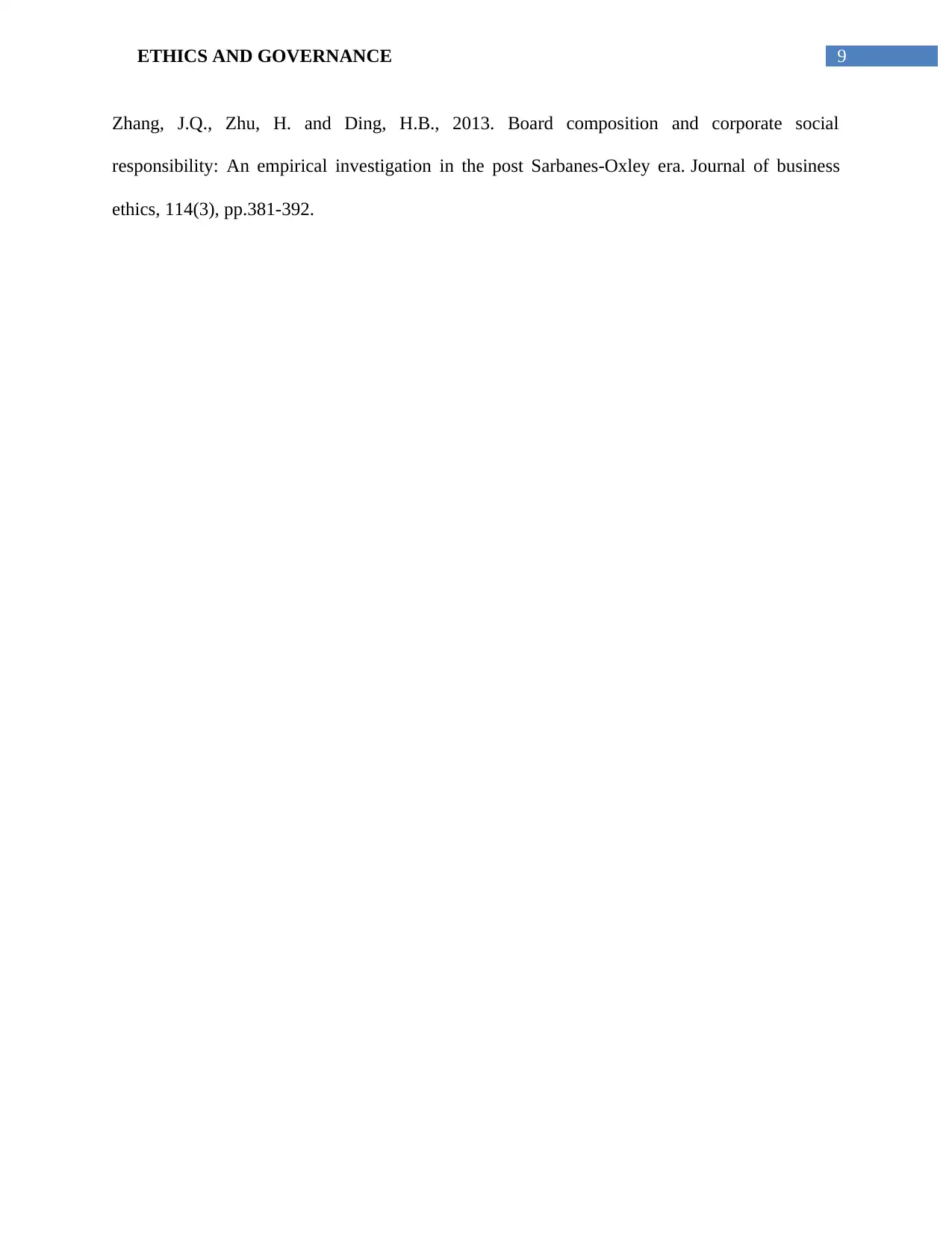
9ETHICS AND GOVERNANCE
Zhang, J.Q., Zhu, H. and Ding, H.B., 2013. Board composition and corporate social
responsibility: An empirical investigation in the post Sarbanes-Oxley era. Journal of business
ethics, 114(3), pp.381-392.
Zhang, J.Q., Zhu, H. and Ding, H.B., 2013. Board composition and corporate social
responsibility: An empirical investigation in the post Sarbanes-Oxley era. Journal of business
ethics, 114(3), pp.381-392.
1 out of 10
Your All-in-One AI-Powered Toolkit for Academic Success.
+13062052269
info@desklib.com
Available 24*7 on WhatsApp / Email
![[object Object]](/_next/static/media/star-bottom.7253800d.svg)
Unlock your academic potential
Copyright © 2020–2026 A2Z Services. All Rights Reserved. Developed and managed by ZUCOL.